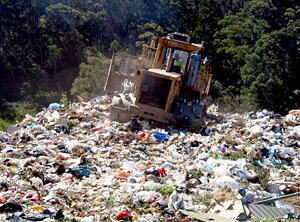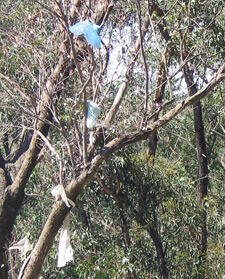Dear Erinn,
If everyone in the world stopped recycling, we would be up to our ears in no time in — you guessed it — garbage.

What would happen if everyone in the world stopped recycling?
— Erinn M., Grade 5
Publications manager Jennifer Stenzel answers this question:
Dear Erinn,
If everyone in the world stopped recycling, we would be up to our ears in no time in — you guessed it — garbage.
Waste disposal has become a huge problem in many parts of the world. And here in the United States, we produce more garbage than practically anywhere else.
Recycling is critical to reducing the amount of waste going into landfills. According to the US Environmental Protection Agency, recycling (including composting) diverted 82 million tons of material away from landfills and incinerators in 2006. That means that more than 30 percent of the waste generated by Americans was recycled. That is really terrific!

Our garbage ends up in landfills, which are filling up fast around the country.
But in order to protect the environment and solve the problem of overflowing landfills, we can still do more.
We can all make a difference by recycling all that we can — especially cans, bottles, and paper. But as important as recycling is, it is actually the last in the now-familiar trio of " reduce, reuse, recycle ."
The best thing to do is to reduce — to decrease the waste we "create" in the first place. For example, let's say you are at the store, and you buy two or three things — like a comb, a bar of soap, and a pack of gum. Do you really need a new plastic bag to carry these things home with you? Or is it just as convenient to put them in your backpack?
Secondly, we can reuse the things that we already own. For example, you can use the same plastic bag over and over again. To close the "recycling loop," we can purchase products made with recycled materials.
Why is reducing, reusing, and recycling so important? Plastic products, for example, can take some thousands of years to degrade. And non-renewable energy sources, like petroleum, are usually used to make them. When we think about the whole life cycle of products that we buy, it can help motivate us to get in the habit of reducing and reusing.

Plastic bags are everywhere. They get caught in trees and they clog our waterways.
In no time, you'll be noticing the next time you see someone accept one small item in a new, huge plastic bag. And this is where you can spread the word. You can urge your local supermarket and other stores to encourage reuse. Maybe they can offer a rebate for each bag reused (usually it's 5 to 10 cents per bag)? It all adds up — for our wallets and for our world.
So keep reducing, reusing, AND recycling!
You Can Make a Difference!

Name:
Jennifer Stenzel
Job Title:
Publications Manager, Center for
Biodiversity
& Conservation
Known For:
Jennifer coordinates a public program at the Museum called "Living With Nature" that helps people make conservation choices.
Cool Fact:
In graduate school, Jennifer researched how much energy New York City could save by replacing old, inefficient refrigerators in public housing apartments with new, super-efficient models. Her research was so convincing that the plan was put into action. Tenants got brand new refrigerators, the City saved money, and less energy was used!